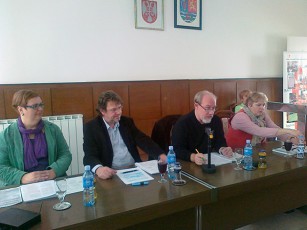Learning to Live Diversity Together
 School is the best place to learn about one's own and other cultures, human rights and discrimination because it provides students with an opportunity to learn about intercultural communication, to acquire and develop intercultural skills. This was the conclusion of the round table discussion entitled Living Interculturality, Teaching and Learning Using the Example of the 'Multiplication - Living Tolerantly' Project. The round table was the final project event hosted by the Panonija Civic Association from Novi Sad, Serbia.
School is the best place to learn about one's own and other cultures, human rights and discrimination because it provides students with an opportunity to learn about intercultural communication, to acquire and develop intercultural skills. This was the conclusion of the round table discussion entitled Living Interculturality, Teaching and Learning Using the Example of the 'Multiplication - Living Tolerantly' Project. The round table was the final project event hosted by the Panonija Civic Association from Novi Sad, Serbia.
On this occasion, Ankica Dragin, the PR Advisor to the Provincial Protector of Citizens - Ombudsman (PPCO) and one of the authors of the Vojvodina Students on Discrimination research study report presented it to the round table participants. The study on the high school students' perception of (ethnicity based) discrimination was conducted in 12 high schools in Autonomous Province of Vojvodina (APV), Serbia in 2011, the year in which young people had been involved in a series of serious interethnic incidents in the APV.
Although most of the students, according to the PPCO study results, are not prone to disclosing discriminatory attitudes or acting accordingly, it still does not mean that the road towards creating an intercultural society is wide open. Two obstacles - namely a pronounced distance between (and among) students of different ethnicities and lack of official, aka majority language skills, with up to 96 percent of the respondents using exclusively their mother tongue in everyday communication - are in the way of students' mutual communication, as well as generation of an intercultural society. If a multicultural society implies diverse cultures living side by side, an intercultural one implies their mutual communication. Based on the cultures' openness and their purposeful, effective interaction, an intercultural society requires from the education system to build students' capacities for a life in a dynamic and pluralistic community by providing them necessary cultural knowledge and skills. The diversities of such a society make us both richer experience-wise and more sensitive to various forms of discrimination and injustice.
The round table was also a chance to present the Living Interculturality, Teaching and Learning Using the Example of the 'Multiplication - Living Tolerantly' Project manual. It is a collection of the outputs and experience of the nine years' collaboration of civil society organizations, high schools, teachers and students on establishing, affirmation and promotion of intercultural values in the Autonomous Province of Vojvodina.